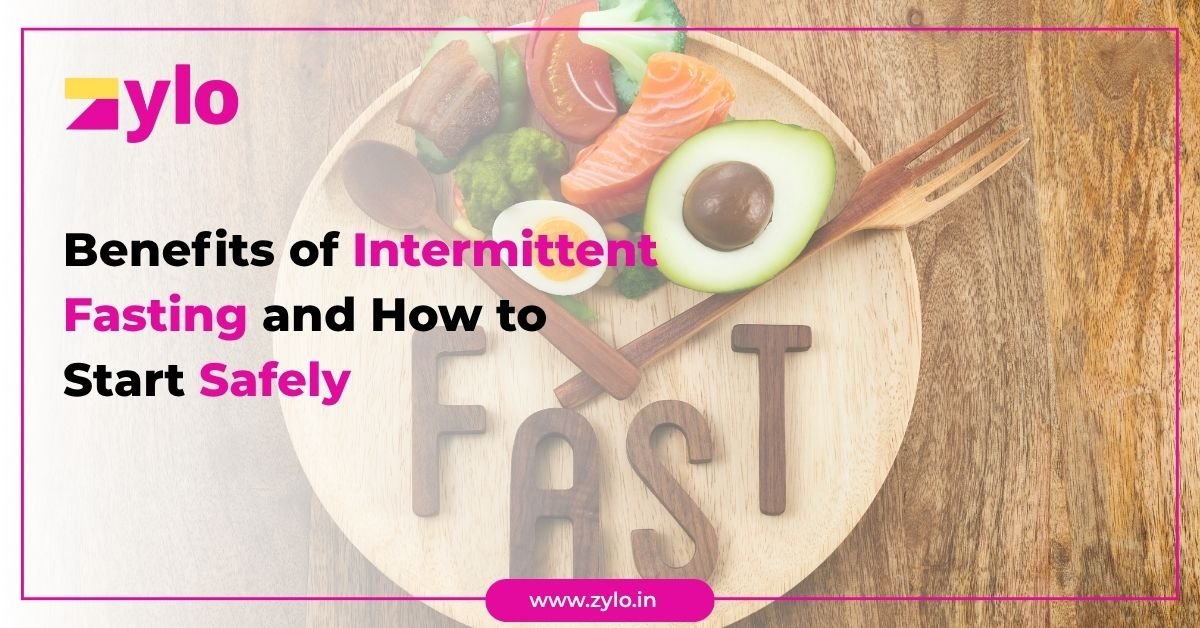In today’s fast-paced world, many are turning to intermittent fasting (IF) not just for weight loss, but for better health and lifestyle balance. Intermittent fasting isn’t a diet—it’s a pattern of eating that cycles between periods of fasting and eating. It’s simple, flexible, and science-backed. If you’ve ever wondered whether it’s right for you, this article breaks down its key benefits and how to start safely—especially if you’re new to the concept.
What Is Intermittent Fasting?
Intermittent fasting involves setting specific windows during the day when you eat and others when you don’t. Some popular approaches include:
- 16/8 Method: Fast for 16 hours, eat during an 8-hour window (e.g., 12 pm to 8 pm).
- 5:2 Method: Eat normally for 5 days a week, and restrict calories to 500–600 on 2 non-consecutive days.
- Alternate-Day Fasting: Fast every other day, eating only around 500 calories or nothing at all.
This pattern allows your body to use stored fat for energy during fasting windows, leading to fat loss and other health benefits.
Top Benefits of Intermittent Fasting
1. Promotes Natural Weight Loss
By reducing the eating window, IF naturally lowers calorie intake without needing intense calorie counting. During fasting, insulin levels drop, which triggers the body to burn stored fat for energy. This makes it an effective and sustainable approach to shedding unwanted pounds.
2. Enhances Metabolic Health
Intermittent fasting improves blood sugar control and increases insulin sensitivity. It helps regulate hormones related to hunger and metabolism like ghrelin and leptin. Over time, this can reduce the risk of type 2 diabetes and metabolic syndrome.

Get Fit, Have Fun and Lose Weight at Home
- Certified Female Trainers
- No gym, no equipment needed
- Flexible timings
3. Supports Brain Health
Fasting stimulates the production of brain-derived neurotrophic factor (BDNF), a protein that supports brain function and resilience. IF may also reduce oxidative stress and inflammation, both of which are linked to age-related cognitive decline.
4. Improves Digestive Function
Constant eating doesn’t give your digestive system a break. IF allows your gut to rest and reset, potentially reducing bloating, gas, and indigestion. Many people report better gut health and regularity after switching to intermittent fasting.
5. Reduces Inflammation in the Body
Fasting has been shown to reduce markers of inflammation, a major driver of many chronic diseases including arthritis, heart disease, and cancer. This anti-inflammatory effect is one of IF’s most powerful long-term benefits.
6. May Slow Aging and Increase Longevity
Animal studies have consistently shown that fasting can extend lifespan. While human studies are still ongoing, the benefits of cellular repair, improved insulin sensitivity, and reduced inflammation suggest that IF can play a role in healthy aging.
7. Increases Energy and Mental Clarity
Once your body adapts to using fat for fuel, most people report increased energy levels and sharper focus—without the crash that follows carb-heavy meals. Many people enjoy morning productivity without being weighed down by breakfast.
How to Start Intermittent Fasting Safely
Starting IF doesn’t have to be difficult. Here are key steps to ease into it without stress:
1. Choose the Right Method
Start with a beginner-friendly method like 12/12 (fasting for 12 hours, eating in the other 12) before progressing to 14/10 or 16/8. Gradual shifts help your body adapt without energy crashes or headaches.
2. Stay Hydrated
Water, herbal teas, and black coffee are your best friends during fasting windows. Dehydration is common when you’re not eating, so drink plenty of fluids to keep your body and brain functioning well.
3. Break Your Fast Gently
When you end your fast, don’t go straight for sugary or heavy meals. Start with nutrient-rich foods—think protein, fiber, and healthy fats. This will reduce blood sugar spikes and help you feel satisfied longer.
4. Listen to Your Body
In the beginning, you might feel tired or irritable. That’s normal during the adjustment phase. But if you feel dizzy, overly fatigued, or experience digestive issues, consider shortening your fasting window and increasing gradually.
5. Avoid Overeating During Eating Window
A common mistake is to binge during eating hours. To make IF effective, you still need to eat mindfully—prefer whole foods, vegetables, lean proteins, and healthy fats. Balance is key.
6. Don’t Skip Sleep or Exercise
Sleep and movement enhance the effects of intermittent fasting. Aim for 7–8 hours of quality sleep and include moderate exercise like walking, yoga, or strength training for best results.
Who Should Be Cautious About Intermittent Fasting?
Intermittent fasting is generally safe for most healthy individuals, but it may not be suitable for:
- People with a history of eating disorders
- Those with low blood pressure or blood sugar issues
- Pregnant or breastfeeding women
- Teens or children
- Anyone with a chronic condition should consult a doctor first
Especially when focusing on weight loss for girls, it’s essential that nutrition isn’t compromised during the eating windows. Adequate protein, vitamins, and minerals are crucial during adolescence and young adulthood.

Get Fit, Have Fun and Lose Weight at Home
- Certified Female Trainers
- No gym, no equipment needed
- Flexible timings
Tips for Long-Term Success
- Track your progress through a journal or app.
- Be flexible. You can adjust your fasting schedule based on your lifestyle or events.
- Pair fasting with other healthy habits like daily walks, mindfulness, and balanced nutrition.
- Stay patient. The benefits of IF often build over weeks, not days.
Final Thoughts
Intermittent fasting isn’t a miracle fix—but it is a powerful tool when done right. It teaches discipline, improves metabolic health, and helps you reconnect with real hunger cues. Whether your goal is better energy, clearer thinking, or safe and steady weight loss, IF can support your journey.
Start small, stay consistent, and remember: the healthiest path is the one you can stick with. And above all, always prioritize whole foods and your well-being over any trend.



